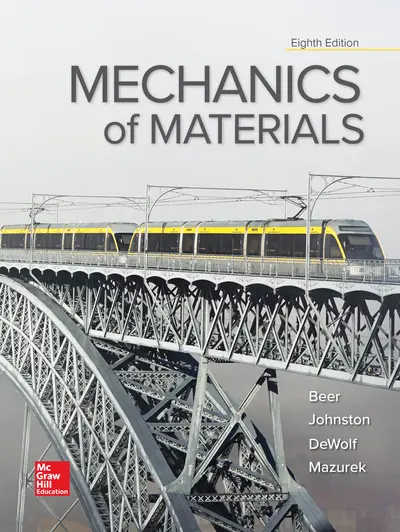My Account Details

ISBN10: 1260113272 | ISBN13: 9781260113273

* The estimated amount of time this product will be on the market is based on a number of factors, including faculty input to instructional design and the prior revision cycle and updates to academic research-which typically results in a revision cycle ranging from every two to four years for this product. Pricing subject to change at any time.
Instructor Information
Quick Actions (Only for Validated Instructor Accounts):
Mechanics of Materials provides a precise presentation of subjects illustrated with numerous engineering examples that students both understand and relate to theory and application. The tried and true methodology for presenting material gives students the best opportunity to succeed in this course. From the detailed examples, to the homework problems, to the carefully developed solutions manual, instructors and students can be confident the material is clearly explained and accurately represented.
McGraw-Hill Education's Connect, is also available as an optional, add on item. Connect is the only integrated learning system that empowers students by continuously adapting to deliver precisely what they need, when they need it, how they need it, so that class time is more effective. Connect allows the professor to assign homework, quizzes, and tests easily and automatically grades and records the scores of the student's work. Problems are randomized to prevent sharing of answers an may also have a "multi-step solution" which helps move the students' learning along if they experience difficulty.
1) Introduction-Concept of Stress
2) Stress and Strain-Axial Loading
3) Torsion
4) Pure Bending
5) Analysis and Design of Beams for Bending
6) Shearing Stresses in Beams and Thin-Walled Members
7) Transformations of Stress and Strain
8) Principal Stresses Under a Given Loading
9) Deflection of Beams
10) Columns
11) Energy Methods
Appendices
A - Principal Units Used in Mechanics
B - Centroids and Moments of Areas
C - Centroids and Moments of Inertia of Common Geometric Shapes
D - Typical Properties of Selected Materials Used in Engineering
E - Properties of Rolled-Steel Shapes
F - Beam Deflections and Slopes
G - Fundamentals of Engineering Examination
Accessibility
Creating accessible products is a priority for McGraw Hill. We make accessibility and adhering to WCAG AA guidelines a part of our day-to-day development efforts and product roadmaps.
For more information, visit our accessibility page, or contact us at accessibility@mheducation.com
Need support? We're here to help - Get real-world support and resources every step of the way.